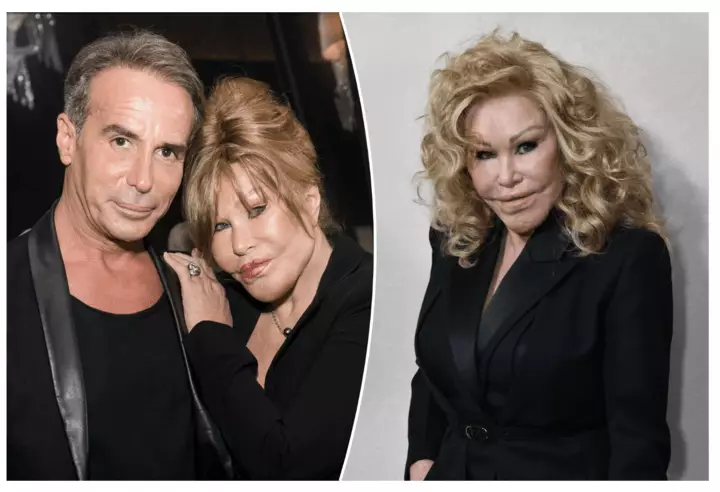Jocelyn Wildenstein, often referred to as “Catwoman,” captured public attention not just for her outlandish persona but also for her tumultuous life marked by love, loss, and controversy. Following her recent death, her fiancé Lloyd Klein has spoken out passionately, defending her reputation amid a torrent of negative portrayal in media outlets. Klein’s reflections reveal not only the depths of their relationship, spanning over two decades, but also the challenges Wildenstein faced that led to the financial tribulations most reports have emphasized.
Klein’s insistence that Wildenstein, who passed away at 79, was not financially destitute despite rumors of bankruptcy offers a glimpse of a life that was filled with glitz and glamor but also marred by deep sorrow. When he declared, “She was fabulous. She was the love of my life,” it was clear that his grief was layered with a longing for the life they built together. This intimate portrayal starkly contrasts the public’s perception of Wildenstein as merely a wealthy eccentric with a penchant for surgeries. Klein emphasizes that her lavish lifestyle was not merely a display of wealth but rather a reflection of her spirit, which he lovingly nurtured.
This complexity mirrors the conflicting narrative often seen in tabloid depictions of high-profile personalities—celebrity lives are often reduced to caricatures, leading to misguided public perception rather than a nuanced understanding.
Wildenstein’s divorce from her billionaire husband Alec Wildenstein was fraught with turmoil, serving as a watershed moment in her life. The terms of their divorce settlement, wherein she was meant to receive $2.5 billion and an annual $100 million, paint a picture of a woman stepping out of a gilded cage into a world of potential wealth. Yet, the reality was quite the opposite. The annulment of those payments by Alec’s family plunged her into a dire financial situation, ultimately culminating in bankruptcy.
Klein has recounted the devastating fallout from this betrayal, suggesting that Wildenstein’s financial woes were exacerbated by the “fake painting” purported to be a Diego Velázquez—an unfortunate product of her trust settlement. This unfortunate turn of events, combined with her familial struggles, triggered a financial collapse that few could anticipate, especially from an individual formerly perceived to inhabit a world of endless riches.
A Woman of Resilience and Humor
Through all the tumult, Klein painted Wildenstein as a strong and resilient woman. “Jocelyn was a strong woman – she survived being publicly cheated by her husband,” he asserted. The capacity to endure ridicule and still find joy amidst chaos is a testament to her character. Klein reflects on their shared moments and her whimsical nature, regaling the story of how she embraced the “Catwoman” moniker with humor, rather than allowing it to wound her pride.
While many might define her by her appearance and the surgeries that have garnered mockery, Klein argues that Wildenstein was more than her looks—she had a sense of humor and loved fiercely. In her eyes, they shared laughter in moments of vulnerability, reminding others that humor can deflect the weight of societal judgment.
Jocelyn’s life story underscores various themes such as love, betrayal, and the search for identity in a world obsessed with image. Klein’s portrayal serves to humanize a woman frequently objectified by media narratives. In discussing her posthumous reputation, he emphasizes the necessity of respect and dignity in the dialogue surrounding Wildenstein’s life. “Jocelyn doesn’t deserve to be ridiculed,” he said. “People need to have respect for a human being.”
Although Wildenstein was known for her extravagant lifestyle, her legacy goes beyond the confines of her high-profile life. It challenges the notion of identity shaped chiefly by external appearances, showcasing how the interplay of love and human connection can transcend societal judgment. Her journey reflects the complexities of love—each moment of happiness balanced against the undertow of tragedy and loss.
In the wake of Wildenstein’s passing, Klein’s future plans—to celebrate her life and scatter her ashes in Kenya—cast a reflective light on the memories they created together. His desire for her to be remembered not just as a figure of ridicule—but as a nurturing, humorous individual who loved in a profoundly complex way—endeavors to shift the prevailing narrative from mere spectacle to respectful remembrance.
As conversations of legacy unfold, it becomes evident that Wildenstein’s story is a multifaceted one, woven with threads of resilience, humor, and the inevitable struggles faced by too many in the glare of public scrutiny. In remembering Wildenstein, we must embrace a more compassionate perspective, fostering understanding beneath the surface of fame and beauty.


Leave a Reply